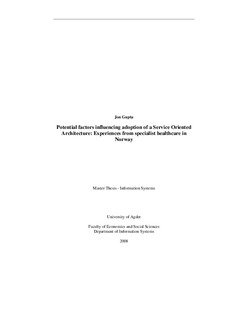| dc.description.abstract | Specialist healthcare in Norway is an important part of the medical care ”value
chain” financed by the Norwegian government through the Ministry of Health and
Care Services. The specialist healthcare sector in Norway is facing increasing
challenges amongst others relating to; national reporting, frequent organizational
and process changes, budget cuts, collaboration across organizational borders and
judicial issues related to accessing sensitive information.
Previous research in other countries has shown the healthcare sector as a lateadopter
when it comes to using new IT paradigms and IT technologies to solve
collaboration challenges, even if they have the potential to create a more effective
workplace. The Service Oriented Architecture (SOA) is a relatively new approach
to structuring and managing IS portfolios in a way which could contribute to
improved alignment of the use of IT to the strategic goals of the business.
Establishing a SOA could therefore be one potential remedy to some of the
problems faced by the specialist healthcare sector, but it probably needs to be
matched by corresponding organizational and management remedies that support
the roles and responsibilities needed to make the SOA operational at the national,
regional and local level.
This thesis sets out to describe and explain what potential factors could be
influencing adoption of a SOA in the specialist healthcare sector of Norway.
Multiple case studies have been conducted using an empirical research strategy,
with an interpretive point of view. This has implied an ideographic perspective,
involving hermeneutics and subjective interpretation by an involved researcher. I
have analyzed the data involving the concept of the hermeneutic circle extracting
themes from the interviews and aggregating these themes into grand themes.
Thereafter I have compared themes across interviews, viewing the final result
through the lens of previous research.
My findings indicate that specialist healthcare has made the decision to adopt a
SOA, but has in general not made significant advancements beyond that stage.
There are indications that much remains to be done if the different stakeholders are
able to benefit from the advantages promised by a SOA. The suggested conceptual
framework indicates that process management, information management, IS
portfolio management as an integrated SOA governance discipline, competence,
stakeholder support, organization, information security, the adoption of the Web
Services Architecture, healthcare vendors and standards compliance could all be
potential factors influencing the adoption of a SOA in specialist healthcare in
Norway.
These findings could be a useful starting point for further research on SOA
adoption with a more general goal in view. This thesis could also possibly be a
fundament for possible actions formulated by practitioners in specialist healthcare. | en |
